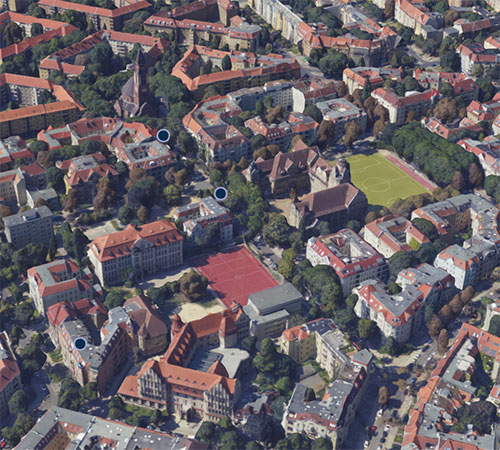Schools and Education
Berlin's schools are attuned to the demands of the modern knowledge and information society: Diversity, openness and multiculturalism are reflected in their curricula.
Pre-school language tests and language reinforcement courses
Language skills are critical for success in school. When parents register a child for primary school, the school tests the child's ability to communicate in German. Wherever a need for improvement is identified, the children are required to take a half-year language reinforcement course before they enter school. This way, all children start school equipped for success.
Overview of types of schools in Berlin
Primary school
All primary schools in Berlin are all-day schools. Reliable half-day schools (verlässliche Halbtagsgrundschulen) guarantee instruction and care from 7:30 am to 1:30 pm at no cost. Open all-day schools (offene Ganztagsgrundschulen) supplement the care available at reliable half-day schools by additional hours of child care. Parents must demonstrate a need for additional care and pay a fee depending on their income in order for their children to attend an open all-day school.
Compulsory all-day schools (gebundene Ganztagsgrundschulen) offer no-cost instruction and care between 8:00 am and 4:00 pm, which all students are required to attend. Parents who demonstrate a need for additional care can register for before- and after-school care modules, subject to a fee depending on their income.
Integrated Secondary School (ISS)
The secondary schools have replaced the Hauptschule, Realschule and Gesamtschule and offer all school-leaving qualifications, from the vocation training entrance (Berufsbildungsreife) to the school leaving examination (Abitur). For this purpose, the ISS has an upper secondary school level or cooperates with other secondary schools.
Secondary school (Gymnasium)
Schoolchildren can take the school leaving examination (Abitur) after 12 years of school at the Gymnasium and thereby acquire the right to study at a university or college. As a rule, the Gymnasium begins with the 7th grade. some Gymnasium schools start with the 5th grade.
Community school
The community schools concentrate on more equal opportunities through learning communities from the 1st grade to the end of school. The community schools, like secondary schools, all offer school-leaving qualifications.
School with a special educational focus
Teaching staff and facilities at special schools are geared towards children and young people with special educational needs.
Upper Secondary School Center (OSZ)
In addition to vocational training courses, the upper secondary school center also offer the opportunity to obtain the school leaving examination (Abitur) or the technical college entrance qualification. They are important cooperation partners of the integrated secondary schools.
State European School Berlin (SESB)
Numerous primary and secondary schools offer bilingual education as a branch of the State European School. The lessons are given by a native speaker in German and in one of nine other languages.
Schools information center
Berlin’s schools offer many paths to graduation. Nowhere else in Germany does such a diverse education landscape exist. Berlin's schools are varied in form and allow students to choose a path that suits their goals and learning styles.
Information Center of the Senate Administration for Education, Youth and Family
(Senatsverwaltung für Bildung, Jugend und Familie)
Bernhard-Weiß-Str. 6
10178 Berlin
+49 30 90227-5050
www.berlin.de/sen/bjf/service/infopunkt
